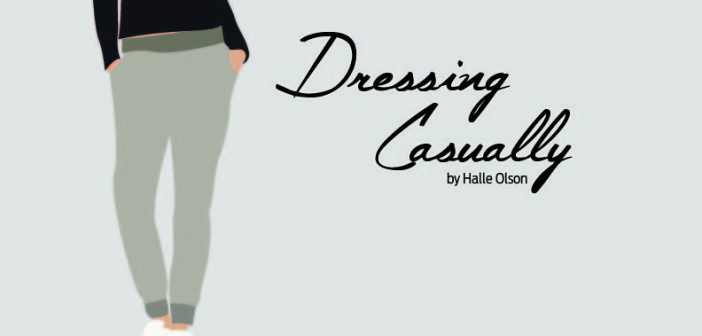“How one dresses influences my initial analysis of a person,” said senior track athlete and photographer, Adam Lundquist. To some, first impressions are important.
“I view school and class as a job, and those who wear items such as sweatpants, pajamas, or athletic slides strike me as individuals who do not take their work very seriously,” Lundquist said.
So the saying goes: “Dress to impress.” But what does that really mean? How you dress can affect many areas of your life, particularly in the classroom. It affects others’ perceptions of you as well as your level of productivity.
Personal style and dressing can affect your productivity according to Dr. Karen Pine, professor of psychology at the University of Hertfordshire and fashion psychologist. In a 2013 article published by Forbes, Pine said, “When we put on an item of clothing it is common for the wearer to adopt the characteristics associated with that garment. A lot of clothing has symbolic meaning for us, whether it’s ‘professional work attire’ or ‘relaxing weekend wear,’ so when we put it on we prime the brain to behave in ways consistent with that meaning.”
Lundquist agrees with this saying, “I dress for school as though I’m dressing for work.” It helps him to feel prepared for the day.
Dr. Emily Cramer, a communications professor at North Central College, said that sometimes there can be issues outside the classroom that affect how students dress.
“Stress and pressure can be a big factor along with self-esteem,” said Dr. Cramer. But, in other cases, students use clothing as a way to express themselves in their first few years of independence.
In college, many of Dr. Cramer’s friends would wear pajamas or sweats to class as a way to explore other options of dressing. This casualness was a consistent trend that Dr. Cramer noticed throughout undergraduate school.
She noticed something different when she was in her master’s program and even when getting her Ph.D.: “The biggest difference was between those who had been in the world of work and those who hadn’t. Students who had been working and then came back to get their master’s degree typically dressed business casual.”
Dr. Cramer herself even admits to wearing pajamas during classes and shares some advice for students: “Dress for the position that you aspire to be in.” This tip came from a former boss and has stuck with her since, and for good reason.
“Dressing for the position you want to be in shows that you care and that you fit in. I’ll observe how other professors in my department dress and base my choices off of what they wear,” she said.
By no means does this mean try and follow the most fashion-forward person on campus. Just be true to your own style and think of school as a job and think of yourself as someone who is aspiring to reach a higher position, whether that be an internship, job or just getting good grades in class.

